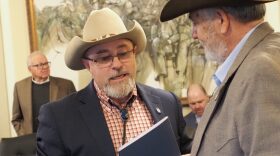After earning his graduate law degree from New York University, Brent Howard accepted a job in Oklahoma City.
But he quickly decided the long hours that came with practicing law in a metropolitan area wasn’t for him, and moved back to his hometown of Altus and the family farm.
“I didn’t feel I had the quality of life I wanted to pursue,” said Howard, who also serves as a Republican state senator. “I just felt a calling to be back home, work with my family and have my own practice.”
Howard, who is also a fifth generation family farmer, is one of 40 attorneys who lives in Jackson County, a county of about 25,000 residents in southwestern Oklahoma. Neighboring Harmon County has four attorneys while Greer has just two.
The counties are among a growing number grappling with a shortage of lawyers, which experts say is requiring Oklahomans to travel further to obtain legal representation and creating access disparities between those who can afford attorneys and those who cannot.
Howard said it also creates a conundrum for the state’s criminal defense process because defendants facing charges are constitutionally guaranteed the right to an attorney if they cannot afford one.
In all, an estimated 20 Oklahoma counties have been classified as a “legal desert,” meaning they have fewer than one licensed attorney for every 1,000 people, according to an Oklahoma Bar Association analysis. Another 29 had fewer than 1.5 lawyers per 1,000 residents, according to the group’s latest analysis.
The shortage of lawyers is a national issue, but Oklahoma’s dearth has captured the attention of Oklahoma Supreme Court Vice-Chief Justice Dana Kuehn. She talked about the issue recently during a presentation to the Stillwater Frontier Rotary Club.
When people go to law school in Norman, Oklahoma City or Tulsa, many don’t return to practice in the rural communities they came from, Kuehn said after the meeting.
“It is called a drought in the rural communities,” she said.
While Oklahoma and Tulsa counties have thousands of practicing attorneys, others have fewer than a handful.
The problem is exacerbated by the fact that in Oklahoma, the state’s practicing attorneys are aging, said Dale Kenyon Williams Jr., Oklahoma Bar Association president.
More of the organization’s members are now over 70 than under 30, he said.
He said most Oklahomans also cannot afford legal services, which has increased the number of people representing themselves in legal proceedings or who are relying instead on the internet or artificial intelligence for legal advice and assistance, Williams said.
“In person interaction is absolutely the best way to establish a trusting relationship and work together to accomplish the client’s goals,” he said.
The cost of an education
Williams, who has practiced since 1977, said the skyrocketing cost of a legal education coupled with a bad reputation for the profession has contributed to the shortages.
“Lawyers do much more than plaintiffs’ work,” said Marc Roark, University of Tulsa College of Law interim dean. “They do probate. They do family matters. They represent families when they find themselves in criminal problems. They represent school children as they are navigating the IEP (Individualized Education Program) process for accommodations in schools.”
He said the price of law school has gone up nationally.
The Education Data Initiative, which compiles statistics about higher education, reported in July that the average cost of law school is $217,480, which includes an average tuition cost of about $46,000 per year. In-state tuition rates at public university law schools increased nearly $1,300 between 2023 and 2024, the group found.
The standard rate at the University of Tulsa for tuition is a little more than $30,000 a year, he said.
“Oklahoma law schools are some of the most affordable in the country, yet it is still a lot of money for most people,” said David Holt, dean of the Oklahoma City University School of Law.
Solutions
Holt said some other states have experimented with apprenticeship models as opposed to requiring attorneys to pass the bar exam.
“Some find that attractive and might make a commitment to practice in underserved areas in exchange for that opportunity,” said Holt, who is also the mayor of Oklahoma City.
Solving the problem could also involve assistance with education, teaching students at an earlier age about the profession and making office space and establishing a practice more affordable for young attorneys, said Williams, president of the state bar.
Oklahoma Voice is part of States Newsroom, a nonprofit news network supported by grants and a coalition of donors as a 501c(3) public charity. Oklahoma Voice maintains editorial independence.









